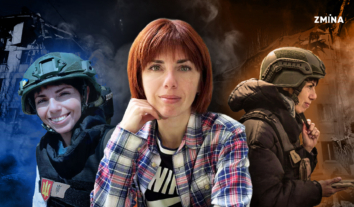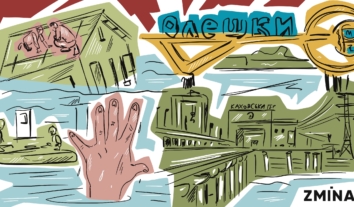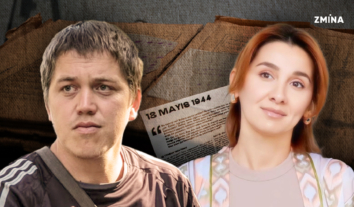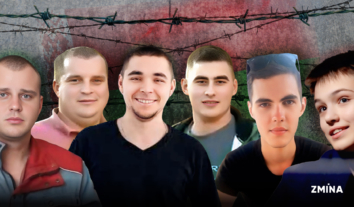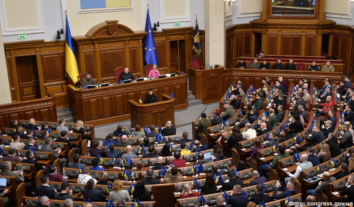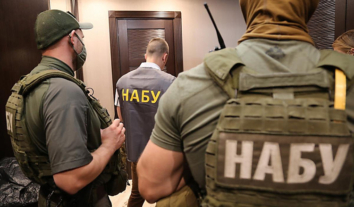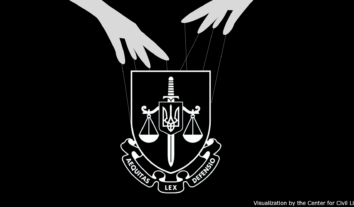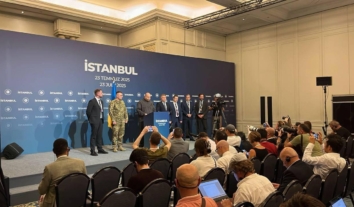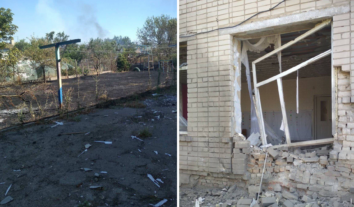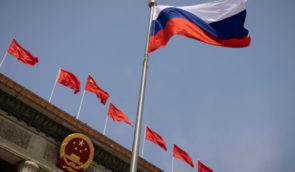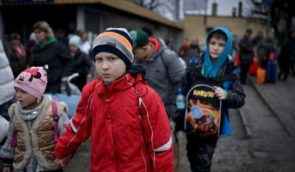“The Biggest Danger in Captivity is to Lose a Part of Yourself:” Human Rights Advocate Maksym Butkevych Speaks About Serving on the Front Line, Captivity, and the Rehabilitation Process
On October 18, 2024, Maksym Butkevych, a prominent Ukrainian human rights advocate and journalist, was released from Russian captivity in the result of a prisoner exchange. He spent more than two years as a POW and a prisoner. On November 13, 2024, ZMINA, a Ukrainian human rights center that Butkevych co-founded in 2012, recorded the first long interview with him since his release.
Liudmyla Tiahnyriadno, a ZMINA representative, met with Maksym in between the stages of his rehabilitation. They spoke about his experiences on the frontlines and during the years of captivity and imprisonment. Maksym described the process of rehabilitation of the recently freed Ukrainian POWs and the challenges that they face while preparing for civilian life.
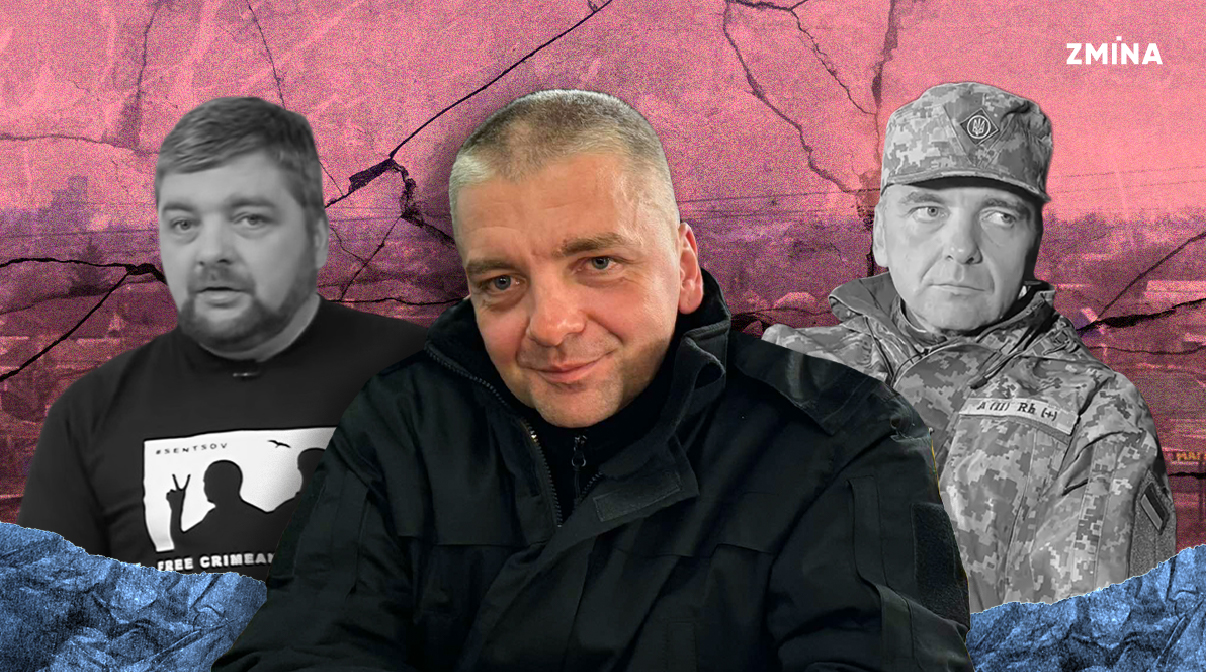
I realized that if Russian forces prevailed, it would no longer be possible to defend human rights on this territory.
Maksym, you had been working as a human rights advocate for twenty years, when you decided to join the Ukrainian Armed Forces in 2024, immediately after the start of the full-scale invasion. What motivated you, a human rights advocate, to enlist?
This is a very important question. I am only now discovering how much has been said and written about me in the media during the time that I was away. Some of the texts describe me as a pacifist. A pacifist I am not. It is true that I do not support violence as a method. Yet I understand that military service, in one way or another, involves killing people, and this certainly presents me with a problem, with a moral and ethical dilemma.
The situation in which we found ourselves on February 24 of 2022 put us before a choice: either we let our agency be taken from us, or we fight. The alternative would have been to give up all forms of meaningful activity – the only thing left would have been to become obedient, to only eat, drink, fear, and do as we were told. That would have been our horizon. So we had to fight. For me, this impulse – to defend one’s freedom to act – is something that is essentially human. Freedom, awareness of having agency, and a particular self-consciousness that comes with that, are what make a person human.
I fully realized at the time that if the Russian forces were to prevail, there would be no possibility to continue defending human rights on this territory. It would be simply impossible. We had been struggling for a really long time to establish the human rights protections that we have in Ukraine now. We did not succeed in everything that we set out to do, but if the Russian forces were to enter these territories, all that we did accomplish through hard work would have been lost. It might sound selfish, but everything that for many years was at the center of my life, all my accomplishments, all my achievements [in the sphere of human rights advocacy] would have been destroyed.
How did you end up in the army and in the 210th Special Assault Regiment Berlingo?
I received some military training during my university studies. By the time I graduated, I held the rank of an officer. In the army, people like me – those who had no real experience of military service, let alone combat, but who held a military rank—were referred to as “suits.”
I came to the military enlistment office in the evening of February 24, 2022, the very first day of the full-scale invasion. I wanted to find a local territorial defense unit and to join it. They asked me about my military rank. I said that I was a lieutenant, but that I remembered nothing about my military training, had no skills and did not know how to do anything, but that I was ready to take a shovel and go dig or do whatever else was necessary.
However, soon enough, fighting came close to Kyiv and Russian forces began showing up on the outskirts of the city. I had a backpack packed in advance with a few things I bought for myself, including a travel-sized Bible, and I was ready to serve. By the way, during my time in the prison colony, faith was one of things that supported me. I never used to speak about it publicly, considering it my private business. I am against forcing anything on people, including religion. At the same time, a sermon is not the same thing as proselytizing. Many people, including my close friends, never knew about my attitude to the matters of faith. Right now, I begin to bring it up more often, for something has changed–both in me and in the world.
We were not preparing to become prisoners, we were preparing to become cargo 200 or cargo 300.
Did you rely on a thought of a higher power or on your own inner strength to survive in captivity?
Inner strength and faith for me are intertwined. I trust that things have meaning, that life has meaning, that it cannot be lost to meaning–and this intuition was bound for me with a trust in my own rescue. To put it simply, I feel that everything happens for a reason.
During one of the interrogations, they [the Russian captors] tried to get passwords to my social media and email accounts. At the time, I didn’t know that my Facebook account had already been deactivated by my friends. In any case, I had a two-factor verification set up, so I told the interrogators that they would not be able to log into my Facebook, for they had lost my phone. I added that maybe the password had been changed already, and if I gave them the password that I knew and it didn’t work, they would think I was making fools of them, try to beat it out of me, but I wouldn’t know the correct one anyway. So they asked “who changed it?” “My friends,” I said.
I left my friends the passwords to all my accounts, in case I were to become cargo 200, that is, to be killed. This way they could go to my page and write about what happened. Or create an automatic response to emails, something like “unfortunately, the recipient cannot read your message because he is dead.” It’s always sad when people leave comments on the posts of someone who is no longer in this world. My interrogator’s eyes rounded with surprise: could I really have thought ahead of time that I might become a “200”? It’s war, I tell him, we all went to fight a war. I’ve found myself in situations when I easily could have become a “200.” Naturally, I considered the possibility. Everyone who comes anywhere near the frontline thinks about death.
So you assumed there was a possibility that you might die in the war?
I think that everyone who goes to the front line, prepares themselves, whether consciously or unconsciously, for what would happen if they were to become killed or wounded – a “200” or a “300.” But I did not notice anyone thinking of what would happen if they were to be captured. We were not readying ourselves for that. In the result, when we did become prisoners, that took us completely by surprise.
Each of us creates their own self by making their choices in life. The choices we make now will determine who we will become. Later, in captivity — both in the pre-trial jail and in the colony – the guys and me would go over what happened and why it happened that way. I was in charge of twenty men. I was a platoon commander in the 210thSpecial Assault Regiment “Berlingo” of the Infantry of the Ukrainian Armed Forces. But in captivity, my fellow prisoners regularly told me: we don’t know what kind of commander you were — I don’t know that myself, to be honest, only my guys can tell me — but it would have been better if you had worked with information or helped people. They say that this is something that I obviously can do well, and that everyone would have benefited more from me staying [behind] and doing that, than from me sitting in a Luhansk pre-trial jail. But in all fairness, anything is more useful than sitting in the Luhansk jail.
I should add that I do not consider that time as entirely lost to me. Sometimes, the guys would get overwhelmed and think that their time in captivity was wasted, crossed out from their lives. I did not have that feeling. And when I would go through what I had possibly done wrong since the beginning of the invasion and whether I’d made any wrong choices, I would come to the conclusion all my choices were correct. There are things I regret in my life, but none in this sequence of my actions. In this case, I did everything right.
How did you realize that your time in captivity was not wasted for you?
The time in captivity was certainly a time of loss. It was a time of being deprived of something very human and something very personal in me. The biggest danger in captivity is to lose a part of yourself. I tried to determine for myself several things: what I could learn from all this, what could be helpful for me in the future, and what could help me become useful to others in the future.
In captivity, I learned more about people, about the world, and, of course, about violations of human rights. You can say that I was on a field research trip that lasted two and a half years. Until my captivity, I’ve never had a chance to really study the penitentiary system and the violations of human rights that go on there. But now that I got to know it quite well, I have a much better and deeper grasp of its basic facts.
I also had a chance to sort out my thoughts and convictions. I reflected on whether or not my beliefs were well-founded, on the interconnections between them, on my attitude toward things. I thought about whether I truly had grounds for thinking what I think and for saying what I say. I thought about what my priorities were and what should take precedence in my activity and in my life.
In captivity, I was constantly thinking about people, who I didn’t have time to think about properly during my life as a civilian.
As an activist, you were shaped by the idea of the existence of universal and fundamental human rights. Did your views on human rights change in any way during your captivity?
I think that my convictions grew only stronger. In our everyday lives, we are immersed in a stream of events, information, and activity. We simply lack the time to consider things from a different — wider and higher — perspective. Very shortly after getting captured, already in the first days, it occurred to me that I received a chance to do just that.
I tried to do the kind of inner work that I’ve been postponing for years. I was constantly thinking about people, who I didn’t have time to think about properly during my life as a civilian. I also prayed. Especially since that was probably the only thing I could do for many wonderful people.
After a year and a half as a prisoner, reading became possible again. So I started reading a lot, as is my habit. Among the Russophone books and the books in Ukrainian, I also managed to lay my hands on a couple of books in English–somebody happened to have them and they were circulating around. Thanks to these books, I tried to hold on to my English, at least as much as it was possible under the circumstances. I was also composing texts in English in my head. In my notebook I made a list of all the books that I’ve read.
What books did you read? Which ones were the most memorable?
The prison colony had a library that had the most unexpected holdings. I was delighted to read Vladimir Zvegintsev’s Theoretical and Applied Linguistics, published in 1968. I read it one and a half times. I discovered for myself a great deal of different books on a wide range of subjects: from animal psychology to philosophy, and theology. I read a lot of fiction as well, for example Chekhov. I was meaning to re-read him for a while, but somehow never seemed to find the time. In general, I re-read a lot of things with different eyes. Until the late spring of 2024, the library also had books in Ukrainian, both by Ukrainian authors and foreign literature in translation. But by early summer that year, all of them were removed.
The first printed text worthy of being called a book that I held in the pre-trial jail was a volume of the New Testament and Psalms. It found its way into our cell through a very strange set of circumstances. I re-read it probably fifteen times. Since not everyone in our cell had the capacity to read, from time-to-time we would read books aloud. One of my cellmates, a POW, lost most of his vision as a result of getting wounded, another man lost his sight because of advanced age. During my imprisonment, I read dozens of books, probably about fifty or more. On the workdays in the colony, my golden time was the forty minutes before the curfew. I would lie down on my “palm tree” — a bed on the top, second tier of bunks — and read for 40 minutes before the lights went out.
In the pre-trial jail and the colony, we also practiced English. I taught it for the first time in life. One of my students even made quite a lot of progress. He insisted that I patent my methodology: In jail we had to study without any texts, without paper, without pens, just by memorizing words according to a special system and by transforming the objects at hand into learning tools.
For instance, we had a cigarette filter, a burnt match, and a piece of a torn cigarette pack. With their help I explained how to structure sentences in English: where to place the auxiliary verb, things like that. We learnt English through song lyrics. I suddenly discovered that I remembered the entirety of several completely unexpected songs. It turned out that one famous English-language song that I remembered was perfect for learning the present continuous tense.
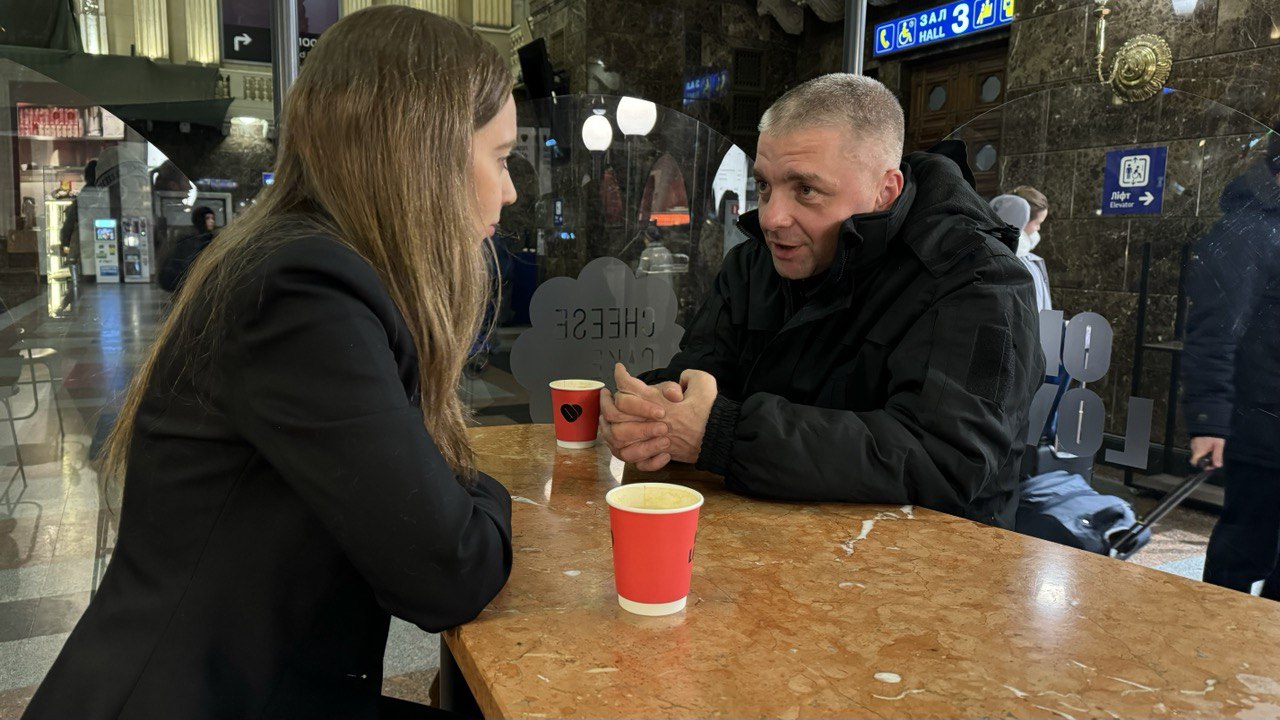 Human rights defender, co-founder of the Human Rights Centre ZMINA, journalist, and former prisoner of war Maksym Butkevych. Photo: Liudmyla Tiahnyriadno
Human rights defender, co-founder of the Human Rights Centre ZMINA, journalist, and former prisoner of war Maksym Butkevych. Photo: Liudmyla TiahnyriadnoLet’s get back to your service. What mission or battle do you remember the most?
There were two stages of my participation in the hostilities: the first in the Kyiv region in the Irpin-Vorzel direction near the Zhytomyr highway, and the second in the East of Ukraine. My unit was tasked with reinforcing the National Guard in a certain area in the Kyiv region. We drove up to the checkpoint and saw that it was not a checkpoint, but the frontline, with Russians standing a few hundred meters away. That’s how we ended up on the frontline in the Kyiv region.
At the end of the street where we stopped a pharmacy, a post office, and several houses were already destroyed by the Russian tank fire. There was the body of a civilian man, who tried to run away from the shelling and didn’t make it; his leg was standing separately from his body. Just a few minutes after we arrived, before we had the time to get out the grenade launchers, an APC drove out at high speed from the Russian side. It stopped in front of us and began to shoot at us from a large-caliber machine gun, showering the entire street with bullets. I remember this episode very well, that was my first direct contact with the enemy. I also remember how we entered a village called Mykhailivka-Rubezhivka: we were liberating villages and towns and the locals would greet us with tears in their eyes, bringing us flowers, cans of tomato juice–whatever they had after a month under occupation. In short, it was absolutely amazing. You could feel how much people were waiting for us.
The second experience was related to a trip to the East. We received an order to reinforce our units that were holding the line of defense in Donbas. That was a completely different experience: we were in the steppe, some of our weapons were entirely ineffective in that landscape. For example, what served to our advantage in urban combat was completely useless there. We played the role of conventional infantry, performing the tasks that were assigned to us.
First, we lost radio reception, and by the morning it became clear that we were practically surrounded.
Please tell us when and under what circumstances you were captured.
We received an order to move to the village of Myrna Dolyna in the Luhansk region. The village was surrounded by the woods and the terrain was rather difficult — it wasn’t a steppe, but gullies. Upon arrival there in the evening, we immediately came under heavy shelling. The fire lasted all night.
In the morning, the village looked completely different from the way it did the night before. Not much was left of it. In the morning there was a pause, and we received an order to move out and take up observation posts along the road that went from Lysychansk to the north and to Zolote to the South. It was a strategically important road for us. Our task was to observe, and if enemy forces were to appear, we had to report them. However, we were not to engage in combat without an order. While the order was being delivered to us, another shelling started, and we went to take our observation positions under its accompaniment.
At some point, the problems with communication began. The radios that we had were not good, there were very few of them, and the enemy’s electronic warfare was obviously working. In addition, we quickly ran out of water on the way to the observation position. I remind you that it was June and the heat was intense. After a few hours, we lost all communication. Even the radios that we were given did not pick up anyone. In the morning, we noticed that a large number of people and enemy vehicles had entered the neighboring thicket.
When we were still moving toward Myrna Dolyna, it was already clear that we were in an area that was almost entirely surrounded by the enemy. You know, it was shaped like a bottle, and we were entering through its neck. All around this bottle was the territory controlled by the enemy. We realized that the situation did not bode well, but we had our orders and we had to follow them. Later, at the observation position, when we saw the “O” markings on the vehicles, we understood that it was the enemy. At that point, we could not execute our order: We could not report the enemy forces and their equipment, for our communication did not work. We did not have an order to engage in combat. That would not have made any sense anyway, given how few there were of us, and how many there were of the enemy’s men. It was clear that we had to withdraw.
It was at that moment that one of the soldiers from the nearby unit, the man who had brought us to the observation position earlier, got in touch with us. He said that the whole area was surrounded, but that the ring around us was not yet completely closed. He said that we should try to leave by following his directions. So we headed out. To be honest, we had a feeling that something was not right, but we didn’t have time to really think about it, and we didn’t have any other option. We had been almost without sleep for several days by then, we did not have any water for nearly a day, we were tired. There were people with health problems in my unit. And this soldier fired a signal flare, which was very strange in the conditions of near encirclement. We had to run across the field to the forest belt from which the flare came. When we were a few dozen meters away from the forest, he told us that he was sorry, but he had been taken prisoner the night before, and that we were now in the enemy sights, and if we did not lay down our arms, we would simply be killed.
What did you feel at that moment?
We were in an open field. There wasn’t even an option to fall, hide, or run away. We were no longer performing any combat mission – we were not covering anyone, not defending anything. I had eight men, and I was responsible for them. So I gave the order to lay down our arms.
Afterward, the kid who led us into the trap was placed in the same cell with us. He was forced to, through physical pressure and violence. But the important part was that he believed that by having us surrender, he was saving our lives — that’s what the Russians told him. Maybe that was true, it’s hard for me to judge.
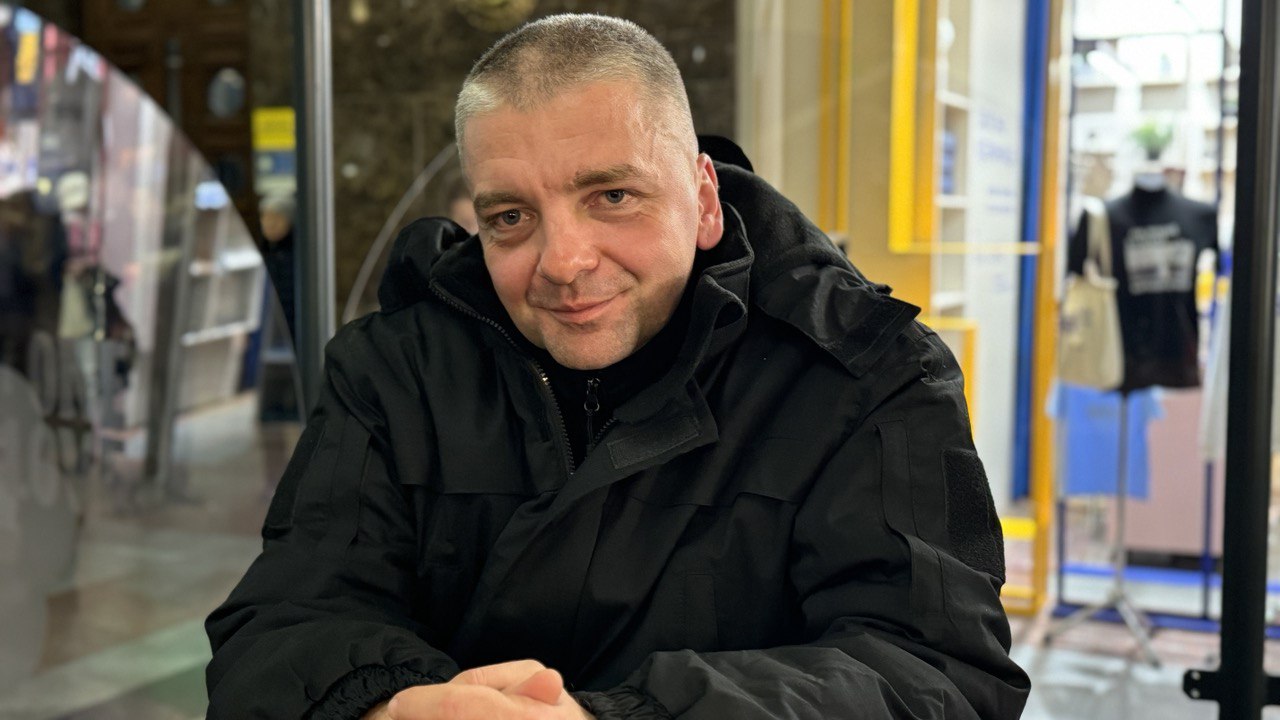 Human rights defender, co-founder of the Human Rights Centre ZMINA, journalist, and former prisoner of war Maksym Butkevych. Photo: Liudmyla Tiahnyriadno
Human rights defender, co-founder of the Human Rights Centre ZMINA, journalist, and former prisoner of war Maksym Butkevych. Photo: Liudmyla TiahnyriadnoHow did the Russians treat you?
They immediately took our documents, phones, and valuable things. For instance, from me they took my wireless headphones. Another person was relieved of his watch, the third one had something else taken from them. One of the Russian soldiers asked whose headphones these were. I answered that they were mine. He asked if I was giving them to him as a gift.
It is true that when you are on your knees with your hands tied and a gun pointing at you, you will agree to give almost anything away as a gift. But I said no. He was very surprised, even a little confused. I told him that headphones were a present from a person close to me, and that one could not re-gift presents. With that he agreed, but he couldn’t figure out what to do next.
They were obviously trying to avoid appearing to be stealing from prisoners. I told him that he could probably say that he was claiming my headphones as a trophy—that sounds more noble than stealing. Later, in a different place, another soldier took what was left–for instance, a new, albeit cheap Chinese tactical watch. This one no longer worried about appearances or how to call what he was doing, he simply took what he wanted. Another Ukrainian soldier, who still had his bulletproof vest on, had it taken away: the Russian taking it asked him not to tell his commanders about that. As we understood, their vests were worse than ours at the time. Along the way they also took our shoes and we had to spend the next few months with only socks on our feet.
Did the Russians know who you were and what you did before you enlisted? Did your past as a human rights advocate and a journalist play any part during your time in captivity?
After a few days in jail, I became an object of special attention. At first, when we were just being taken prisoners, I was treated normally. On the way to the transfer point, the Russians asked which one of us was the officer, and I answered that that was me. They wanted to record a video of me shouting commands. I refused to do that. I told them that they could, of course, force me, but that it would be clear from the video that it was staged and recorded under physical duress.
We were forced to kneel with our hands tied and were verbally abused and intimidated.
Where were you first taken after you were captured?
At the end of the day, we were taken to a half-ruined building. There we spent the night on the concrete floor. At some point, an officer in a balaclava appeared. He was a senior officer and everyone obeyed him. He put us on our knees with our hands tied and treated us to a series of monologues, the goal of which was to provoke emotional responses from our guys. He verbally abused us trying to demonstrate his superiority.
He asked which ones of us had wives abroad, for example, in Poland, Germany or Turkey. He then began to regale us with his pathological sexual fantasies, telling all the things that he imagined the men in those countries were doing to Ukrainian women. He described pictures of forced group, oral, and anal sex. It was clear that this man was disturbed. He threatened that we would be sentenced to 10 to 15 years and sent to a colony for “sexual pleasures,” that we would return to Kyiv without our front teeth. He then explained how exactly we would come to lose those teeth.
Later they brought us military rations. They untied our hands only when, one by one, we walked at gunpoint to a transparent plastic barrel standing in the corner to relieve ourselves.
I should say that afterward we were treated more calmly, without attempts at humiliation. To be honest, I tried not to push too hard. I immediately chose the following line of behavior for myself: I have nothing to hide, but I won’t pretend to be someone that I’m not either. Whenever any risky or provocative conversations began, I tried to take them upon myself, so that the guys would not get into trouble through them.
Did you or anyone from your men experience violence from the Russian soldiers?
Later, when the new uniformed soldiers arrived, they took us one by one to the adjacent rooms, where they asked us about our service and recorded us on video. It was something like an interrogation. When one of our men was brought in, he said that he did not remember the call signs of his commanders. He was hit several times with a wooden hook. I immediately told the guys that since we did not have any secret information, they should do everything during interrogation to save themselves.
The Russian soldiers tried to scare me with a pit in the backyard. They said they could take me there and show me those “who did not know how to behave.”
There was one interesting moment when they recorded the interrogation video of me. One of them said to the other, “Look, he really is a journalist: he managed to say what he wanted, not what we needed.”
Later, the officer in balaclava, whom I’ve mentioned earlier, recited to us passages from one of the Putin’s speeches in which he talks about Ukraine–I believe that particular one was from February 22, 2022. The officer would then point at one of us to repeat what was just said verbatim. Every time a man made a mistake or stuttered, I was beaten with a stick. I was the only officer in the group, the only commander, and that fan of Putin’s historiography had a personal dislike for me. I thought it was better he beats me than my guys.
Afterward we were moved somewhere else and thrown on the concrete floor. They removed the blindfolds from our eyes, untied our hands, and we saw that we were in a cell. Then they brought old torn mattresses and towels, some of which had the stamp of the Luhansk pre-trial jail. That’s how we found out where we were. In total, I spent a year and three months in the pre-trial jail, until September 2023.
On March 6, 2023, the occupation court in the Luhansk region sentenced you to thirteen years in prison and accused you of “the cruel treatment of civilians and the use of prohibited methods in armed conflict.” How did this sentence come about?
In the Luhansk pre-trial jail we were actively interrogated by the representatives of several different organizations: by the people in military uniforms as well as by the people in civilian clothes. We were asked about the movements of our unit, about where we went, and how many of us were there. On July 16, I was interrogated by two people—one of them was in civilian clothes and the other wore some kind of non-statutory camouflage. One of the investigators was interested in the activity of the Soros Foundation in Ukraine and wanted me to give an interview to some unnamed “reputable international media” about it. I said that I didn’t want to give any interview, but that if they forced me, I would tell them what I knew: that the Ukrainian branch of the foundation supported projects that had to do with decentralization, local self-government, legal aid, and academic publications.
He didn’t really appreciate my speech, and that’s when I first heard them say, “We will lock you up.” This promise became real a month later, on August 13. I was taken for interrogation, where uniformed people with covered faces sat me down in such a way that I could only see the floor. It was uncomfortable. They tried to intimidate and disturb me in different ways. Then they told me that I had three options. The first one was for me to sign, without reading, everything that they would place in front of me. It would be a confession to a war crime, I would be convicted and then exchanged. The second option was to refuse to sign the documents, to be then taken for a forensic experiment to the site of my alleged crime where I would be killed for “trying to escape.” And the third option was to remain in prison without any possibility for exchange for who knows how long, or rather, for as long as they wanted. If I refused to cooperate or sign anything, I would not come out in one piece, either physically or psychologically. They said that at the age of 45 it was a fine thing to die. If I agreed with that statement, then they would take me to the backyard, gave me a cigarette, let me call home, and have me shot.
One of the interrogators asked me if I had any interest in living some more, and I said that I did, if God was willing. He latched on to that and when he found out that I was a Christian, he said: “Well, we’re not Christians, it’s all the same to us.” Then they printed out the interrogation report. They were mixed up about where exactly I was supposed to have committed “my crime.” It was only later that I learned that I had allegedly fired a grenade launcher at a residential building and that two women were injured as a result. In any case, according to them, it didn’t matter what was written in those reports— they could have convicted me without my testimony. They told me that if I signed the documents quickly, they would be sent to the prosecutor and then to the court, and that I would be able to go home in October—I would be exchanged.
Later, when they were finalizing my case, I was taken to Sievierodonetsk to the house on which I had allegedly opened fire. They told me to raise my hand and point to a specific window. They took a picture of me doing that, told me to point to the pit, and to remember the address. When I asked what it was all about, they said I would find out later. The only thing I insisted on then, as much as it was possible to insist on anything in that situation, was that I would not testify against anyone, only against myself, and that the case should not involve any dead bodies.
There was no doubt in my mind that I would not serve the entire sentence
What was your reaction to receiving the sentence of thirteen years in prison?
I was expecting it. The guys in the cell and I were speculating about how much I would get. They were more optimistic. I was expecting twelve to fifteen years and that’s pretty much what I got. But I was hoping that there would be a prisoner exchange soon, and that I would be exchanged. I knew that I should not be in prison for thirteen years. I had no doubt that I would not have to serve the entire sentence.
During one of the so-called investigative actions, an officer of the Investigative Committee of the Russian Federation said that the Ukrainian side imprisons Russians to long terms on charges of “illegal crossing of the state border by an organized armed group of people in order to seize part of its territory for another state.” In other words, since Ukraine was handing long sentence to the Russian military personnel for committing this violation and war crimes, the Russian side claimed that they had to give us correspondingly long sentences to make sure that they could exchange their soldiers.
Do you know the fate of the soldiers who were captured with you?
Two of them were exchanged at the end of 2022–one of these two, unfortunately, died later, defending our country and our freedom. Two more were exchanged this year. The rest remain in captivity. None of them were convicted. They all have the status of prisoners of war.
In your experience, what helped you survive captivity and return home?
I never thought that I was forgotten, I was certain that people were trying to do everything possible to free me, that they were thinking about me, and praying for me. I constantly tried to keep my mind busy. I tried to summarize my previous experiences, to establish some internal connections between what I believe in, what I am convinced of, and what I do.
I analyzed my life, tried to understand it. I thought about how I could do things better, worked on my mistakes, tried to set my priorities, tried not to forget English and Ukrainian, wrote op-eds and lectures in my head, recited them out loud to myself, formulated thoughts, and remembered the people I had met in my life.
You are currently undergoing special rehabilitation for people who’ve been recently freed from captivity. How does it work, what does it consist of, and how effective is it?
It is an interesting process. To be honest, I thought that everything would go faster and be more pro forma. The rehabilitation process can be divided into four parts. The first one is medical–rehabilitation, examination, diagnosis, and getting a general picture of the physical consequences to one’s health that one suffered in captivity. The second is psychological, when psychologists work with you and try to prepare you for a return to a normal, freer context. The third is administrative: the recovery of stolen documents, things like that. And the fourth part involves working with law enforcement agencies to establish the circumstances of captivity. They try to fit these four into a fairly narrow timeframe, so the schedule is actually quite tight.
Now I’m trying to figure out where I can be more useful.
What do you plan to do after rehabilitation?
I still have time to think about it. After captivity and treatment, a person is entitled to a 30-day sick leave to recover. During this time, I will think about what I want to achieve in the short term, or rather, how to achieve it better and more efficiently. I am trying to figure out where and in what status I will be most useful.
Human rights advocacy is not going to run away from me. It will be with me for a long time, probably for the rest of my life. It is really an integral part of my life, so I will definitely continue doing it. And, of course, I will continue to work on the matters related to forced migration, refugees, internally displaced persons, discrimination, xenophobia, and hatred. Now I realize that more attention should be paid to the analysis of propaganda and to working with information, to cultivating critical thinking and the ability to perceive reality. But in the near future my priority will be to liberate our military and civilians from captivity.
Maksym Butkevych has been involved in human rights activities for almost 20 years. He was the coordinator of the No Borders Project and co-founder of Human Rights Centre ZMINA and Hromadske Radio. For many years, he has been one of the organisers and hosts of screenings and events at the DocuDays UA International Human Rights Documentary Film Festival.
The human rights defender has held lectures on human rights, hate speech, and refugees for journalists, activists, and government officials in Ukraine and other countries. He worked at the Office of the United Nations High Commissioner for Refugees in Ukraine.
After the beginning of the full-scale war in March 2022, Butkevych joined the Armed Forces of Ukraine and was taken prisoner by Russia in June of the same year.
A criminal case was trumped up against Maksym Butkevych. On March 6, 2023, an illegal “court” in the temporarily occupied part of Luhansk region sentenced the human rights defender and military officer to 13 years in prison for allegedly injuring two women in Sievierodonetsk by firing a grenade launcher into the entrance of a residential building.
The Moscow Court of Appeal upheld the sentence but ruled to count part of the actual time spent in detention – from August 19, 2022 – towards the prison sentence.
In March 2024, the Supreme Court of the Russian Federation upheld the 13-year sentence of a captured human rights defender and serviceman. At the court hearing, he said that he was forced to incriminate himself under threats of torture. The Russian judges refused to include in the case file evidence that Butkevych was not at the scene of the alleged crime at all, or in Sievierodonetsk at all, neither on the day indicated in the “case” nor on any other day of the war. The statement of human rights defenders that he incriminated himself because of promises of a quick exchange and threats of torture was not taken into account.
The trial of Maksym Butkevych was condemned by Ukrainian human rights organisations, Amnesty International, Human Rights Watch, Memorial, PACE members and other organisations.
Russian Memorial recognised Maksym Butkevych as a political prisoner.
In November 2022, Maksym Butkevych was awarded the Czech Award for Stories of Injustice: his father Oleksandr received the award in Prague instead of his son. In 2023, Maksym Butkevych was honoured with the Anne Frank Award for Human Dignity and Tolerance from the Embassy of the Netherlands in the United States and the National Human Rights Prize, presented by the Ukrainian platform Human Rights Agenda.
Translated by Mykyta Chakalov and Anastasiya Osipova

